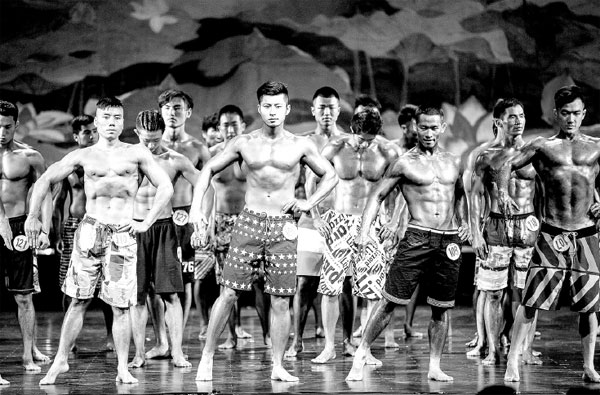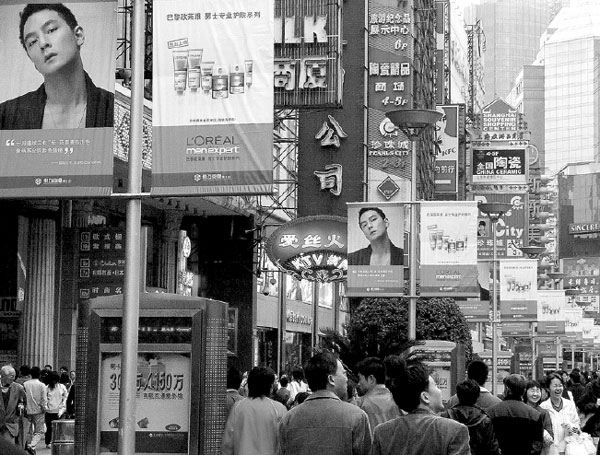Chinese men are just like 'cattle'
Updated: 2015-07-27 14:13
By Wang Mingjie(China Daily USA)
|
|||||||||
What makes Chinese men tick? That question has received attention not only from scholars, but from advertising and media professionals, too, because anyone who can answer it will have a gold mine of marketing data on their hands.
Masculinity studies have developed greatly over the past 30 years, fueled initially by the feminist movement of the 1960s and 1970s that propelled gender onto media and scholarly agendas, said Derek Hird, a senior lecturer in Chinese Studies at the University of Westminster in London.
The field has expanded to include numerous perspectives from scholars from many different backgrounds, looking at masculinity everywhere since Anglophone sociologists formulated theories on the matter in the 1980s, he said.
|
Contestants take part in a bodybuilding contest in Hangzhou, Zhejiang province. Photos Provided to China Daily |
|
An advertisement for men's skin care products along Nanjing Road in Shanghai. |
"In the 1990s and 2000s, Chinese scholars based in Western universities began to write about masculinity in Chinese film and historical and contemporary Chinese fiction," Hird added.
"In the past five or 10 years, more studies of Chinese masculinity have appeared from a variety of scholars based in and outside China. This has helped continue the trend of investigating the lives of different kinds of Chinese men."
Felicia Schwartz, founder and director of China Insight, a consultancy, said: "Businesses that do not study the Chinese men may want to implement a Western strategy based on the wants of Western men or may just make assumptions about Chinese men.
"In a fast-moving market such as China, it's important to keep a finger on the pulse of what motivates and appeals to one's target consumer."
Advertising and media businesses are among the most keen to learn about the Chinese male market and its tastes, Hird pointed out.
"Businesses often look for a magic bullet that can help them crack the market, such as a straightforward keyto understanding Chinese men," he added.
"But masculinities are multiple and diverse, so the reality is more complex."
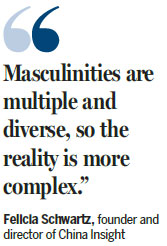
"The value of our research is that it encourages businesses to appreciate this diversity and complexity, and to recognize the particular historical circumstances that have shaped, and continue to shape, Chinese masculinities in dynamic ways.
"It helps them realize that Chinese masculinities cannot be taken as interchangeable with masculinities in Western countries or reduced to simplistic stereotypes," Hird said.
Schwartz said Chinese masculinity is not only different from its Western counterpart, but is also evolving rapidly, splitting into myriad sub-demographic groups.
"The speed of China's development means that there is a much more accentuated difference between men of varying ages, whereas a five-year difference, for example, is not considered as crucial in the West," Schwartz said.
China is huge and diverse geographically, Schwartz added, but "when targeting the 'Chinese man', one has to be clear whether one is targeting the urban male in a first-tier city or perhaps a wider target that might include lower development tiers and even rural areas".
There have been huge shifts in Chinese masculinity in recent decades. After reform and opening up the country, "the working landscape quickly started diversifying, and new aspirational models such as the white-collar worker or company man appeared", Schwartz said.
Initially, the Western aspirational model, including "the American dream", was pervasive, she said, but a wider range of models have appeared in China in recent years.
Examples include the comeback of the junzi, or Chinese Confucian gentleman, or the appearance of the xiaoxianrou (literally little fresh meat), a youth model that Schwartz believes is influenced by the pop culture of Hong Kong and Taiwan.
Sharon Chen, a strategist with the advertising company Leo Burnett China, said: "We always begin (our projects) by exploring the needs of people through market research. Once we identify the insight, we compare it against the benefits that the product can offer to nail down what is really relevant for consumers."
The company has been involved in numerous brand campaigns that target Chinese men, including the one for the Buick Excelle car.
"Their target audience is males between the age of 25 and 40," Chen said. "The insight we found about this group of males is that they are a generation of niu (cattle), ai (love) and chong (dashing).
"Niu refers to catching up with others when everything happens so quickly at this point of time in history, they need to work like cattle to make it," Chen added.
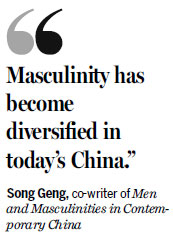
"Ai demonstrates that they have a strong mission to protect their families, and families come first for them. Chinese males are becoming more aware of their role in the family, not just as breadwinners, but also loving husbands and fathers."
"Chong shows that working hard is not good enough," Chen said. "They will have to work with explosive momentum to keep up with the pace of a fast-moving economy."
The perception of Chinese masculinity has recently been reflected in Men and Masculinities in Contemporary China, a book by Hird and Song Geng, associate professor at the University of Hong Kong.
In the book, Song and Hird offered an account of Chinese masculinity in media coverage and everyday life. This covered masculinity on television, in lifestyle magazines, and at work and at home.
"Masculinity has become diversified in today's China. It has become a mixture of traditional Chinese discourses fused with the influence of Western types of masculinity, such as the businessmen and the metrosexual type," Song said.
To build a connection between their research on gender in China, and the media and advertising industries in the West, Song and Hird hosted a workshop at the University of Westminster in London in May entitled: "Understanding Chinese men and masculinity".
Song said the new trends and images in China that they talked about at the workshop may be useful for European businesses that want to explore the market of male customers here.
"Men, especially Chinese men, have been largely ignored as gendered beings in the past, and this awareness of their gender will help promote products targeting the male market," Song added.
wangmingjie@mail.chinadailyuk.com
(China Daily USA 07/27/2015 page13)
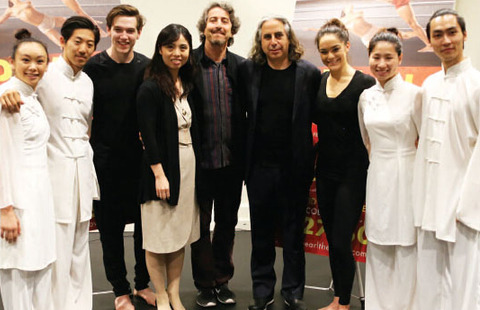
 Across America over the week (July 17- July 23)
Across America over the week (July 17- July 23)
 Unusual but true: 'Love' conquers all
Unusual but true: 'Love' conquers all
 Six dead as rainstorms wreak havoc in China
Six dead as rainstorms wreak havoc in China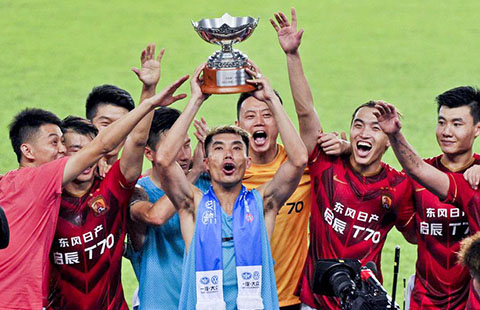
 Guangzhou Evergrande stun Bayern in penalty shootout
Guangzhou Evergrande stun Bayern in penalty shootout
 10 domestic films to see this summer
10 domestic films to see this summer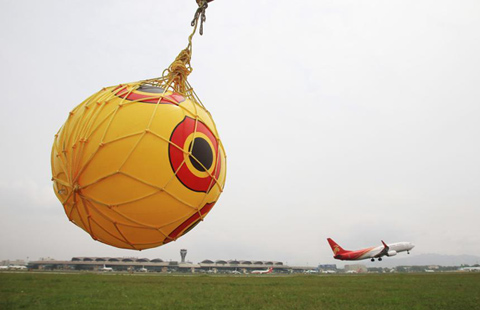
 Tricks airports use to scare away birds
Tricks airports use to scare away birds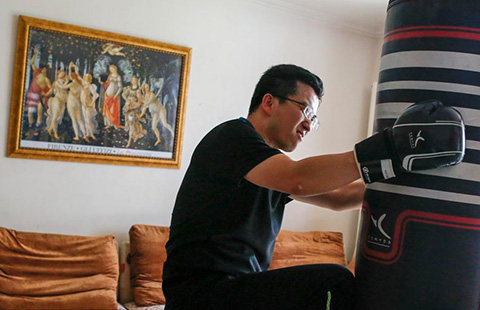
 The highs and lows of a stock market investor
The highs and lows of a stock market investor
 Culture insider: 7 things you may not know about Major Heat
Culture insider: 7 things you may not know about Major Heat
Most Viewed
Editor's Picks

|

|

|

|

|

|
Today's Top News
Astronomers discover most Earth-like planet yet
Seattle Chinatown leader killed in shooting
Flight details of Obama's Kenya trip leaked
2 killed, several injured in Louisiana theater shooting
Deficit hits $104b in first half
Obama to meet extended family members in Kenya
More Chinese companies become world top 500
Earth-like planet discovered using NASA's Kepler space telescope
US Weekly

|

|
